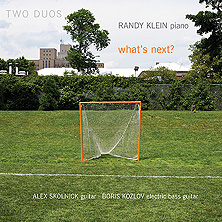 Jazz
duo albums can sometimes be a hit and miss affair yet one that completely
hits the bullseye is What’s Next? by jazz pianist
Randy Klein. For the 12 track, hour long What’s Next?
Randy teams with guitar virtuoso Alex Skolnick and bassist
Boris Kozlov and the results are a delicate yet sonically durable
outing that puts Klein’s sumptuous grand piano skills in a very
favorable light. Both Skolnick and Kozlov are fine players to compliment
Klein’s sensitive sounding, jazzy piano tracks. What’s
Next? is actually the second CD of Randy Klein’s Two Duos
album series from the pianist, the first one being 2010’s Sunday
Morning, featuring Klein with trombonist Chris Washburne and saxophonist
Oleg Kireyev. Guitar fans will note Skolnick’s tasteful fretboard
work on What’s Next, and indeed Skolnick’s deft touch
sounds quite well suited to Klein’s jazzy piano. Commenting on
working with Skolnick and Kozlov on What’s Next? Klein
adds, ‘These are top notch players! And when you play with players
who are on this level, it really becomes a dream come true.’
Jazz fans who appreciate sensitive, varied, acoustic piano-based albums
are truly well served by this album, while music fans should keep
their ears open for more releases from the soon to be acclaimed series
of CD releases from Randy Klein’s Two Duos on Jazzheads—the
record label started by Klein back in 1992. www.RandyKlein.com
Jazz
duo albums can sometimes be a hit and miss affair yet one that completely
hits the bullseye is What’s Next? by jazz pianist
Randy Klein. For the 12 track, hour long What’s Next?
Randy teams with guitar virtuoso Alex Skolnick and bassist
Boris Kozlov and the results are a delicate yet sonically durable
outing that puts Klein’s sumptuous grand piano skills in a very
favorable light. Both Skolnick and Kozlov are fine players to compliment
Klein’s sensitive sounding, jazzy piano tracks. What’s
Next? is actually the second CD of Randy Klein’s Two Duos
album series from the pianist, the first one being 2010’s Sunday
Morning, featuring Klein with trombonist Chris Washburne and saxophonist
Oleg Kireyev. Guitar fans will note Skolnick’s tasteful fretboard
work on What’s Next, and indeed Skolnick’s deft touch
sounds quite well suited to Klein’s jazzy piano. Commenting on
working with Skolnick and Kozlov on What’s Next? Klein
adds, ‘These are top notch players! And when you play with players
who are on this level, it really becomes a dream come true.’
Jazz fans who appreciate sensitive, varied, acoustic piano-based albums
are truly well served by this album, while music fans should keep
their ears open for more releases from the soon to be acclaimed series
of CD releases from Randy Klein’s Two Duos on Jazzheads—the
record label started by Klein back in 1992. www.RandyKlein.com
mwe3.com presents an interview
with
RANDY KLEIN
mwe3: Aside from the different instrumentation, how different
is your new duo album What’s Next? compared to your first
duo album? Also how did you meet Boris Kozlov and Alex Skolnick and
how would you describe the musical chemistry in play on What’s
Next?, how was the material chosen for the album and how did it
begin and end?
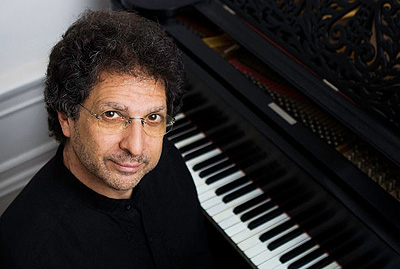 RANDY
KLEIN: The compositions on Sunday Morning, the first CD
from the Two Duos project, are more melody and harmony driven. They
were chosen because they fit the two players performing them. Oleg
Kireyev has a deep warm saxophone sound and Chris Washburne has a
unique facility in all ranges of the trombone. Both are superb all
around musicians and improvisers. As I was preparing What’s
Next?, I wanted to make the CD simply different from the last
one. The most important difference was to use two rhythm instruments
and the compositions on What’s Next? are written with
this idea in mind. The compositions also forced my demands as a pianist
to grow.
RANDY
KLEIN: The compositions on Sunday Morning, the first CD
from the Two Duos project, are more melody and harmony driven. They
were chosen because they fit the two players performing them. Oleg
Kireyev has a deep warm saxophone sound and Chris Washburne has a
unique facility in all ranges of the trombone. Both are superb all
around musicians and improvisers. As I was preparing What’s
Next?, I wanted to make the CD simply different from the last
one. The most important difference was to use two rhythm instruments
and the compositions on What’s Next? are written with
this idea in mind. The compositions also forced my demands as a pianist
to grow.
The back and forth sequencing of the cuts was a result of my listening
to the cuts from Sunday Morning and trying to make the entire
CD take the listener on a musical journey from the beginning to the
end of the CD. I used the same sequencing method on What’s
Next? My desire for the listener to enjoy the recording always
trumps decisions like I played a better solo on that cut, so let’s
front load it.
I knew Boris Kozlov from hearing him play in many situations around
New York City. He always played his upright bass. I then heard him
play with a vocalist in a duo situation at a small club in Brooklyn
and Boris was playing his electric bass guitar. I was blown away by
his technique, musicality and the unique sound he got from the instrument.
I knew instantly that I wanted him to play on What’s Next?
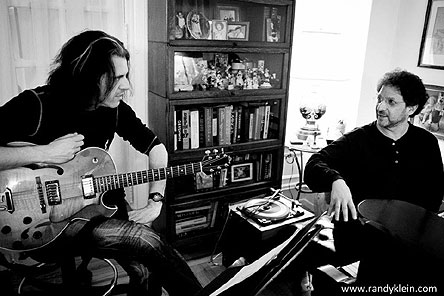 Alex Skolnick
and I met through a referral from my radio promoter for Jazzheads,
Michael Moryc. Michael has really great ears and has the ability to
hone in on what the music is about on any recording. He felt that
Alex and I should play. When we did, it was obviously a match. Alex
is an amazing musician and he thrives in many worlds of music. I went
to one of his gigs with Testament, (his heavy metal group) and my
mouth was agape as I watched Alex climb on the speakers and take one
of the most amazing guitar solos. It is fun for me to play piano with
Alex on guitar because he reinforces the rhythm and it frees me up
to play with more intensity and obviously match the rhythms.
Alex Skolnick
and I met through a referral from my radio promoter for Jazzheads,
Michael Moryc. Michael has really great ears and has the ability to
hone in on what the music is about on any recording. He felt that
Alex and I should play. When we did, it was obviously a match. Alex
is an amazing musician and he thrives in many worlds of music. I went
to one of his gigs with Testament, (his heavy metal group) and my
mouth was agape as I watched Alex climb on the speakers and take one
of the most amazing guitar solos. It is fun for me to play piano with
Alex on guitar because he reinforces the rhythm and it frees me up
to play with more intensity and obviously match the rhythms.
mwe3: How do you balance your time between writing and recording
for your duos series and your other work with teaching music and theater
work. I heard you’re going to the University of Kansas for February?
Is there a story about that?
RANDY KLEIN: I never feel as if my time is balanced between
all of the activities I am involved with. For the most part, this
is the biggest challenge that I have to deal with. Hence the title
of my Two Duos CD, What’s Next? I am constantly asking
myself this question. Over the years, I have developed some personal
techniques to focus on one thing at a time. But my days are rarely
that. If there is a deadline on a project, I put all else aside and
obviously work on that project. But, if I’m working on a project
that will span over many months or even years, I always have it on
my mind and I continually come back to it. Hence, my favorite saying
is the art of writing is re-writing. Getting some distance on a project
makes me much more objective about it. It is almost as if I didn’t
create the work at all and I am critiquing someone else’s work.
Another point is that there are only so many creative hours in the
day. I like the mornings. It is quiet and the phone doesn’t ring,
so I can focus in on more difficult assignments. But, if I have to
write fast, I can. It is similar to improvisation. A learned skill!
Very much in the moment and I make my decisions quickly.
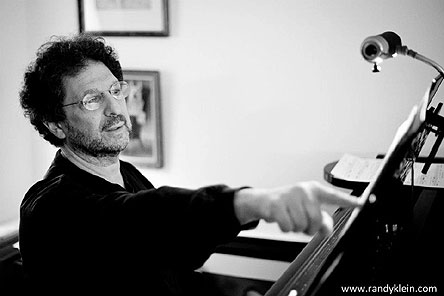 Last
year, I was awarded the Simons Fellowship at the Hall Center for the
Humanities at the University of Kansas. The fellowship was an amazing
experience for me. I spent two months during the 2011-2012 semesters
in Lawrence, KS. I was given my own office with a midi/computer setup
for composing, a beautiful 7’ Steinway B and the keys to the
building. I made the most of this opportunity. I lectured in the music
department, the business of music department and performed with some
of the outstanding improvising students in the jazz school. I also
recorded a series of piano
improvisations. I loved being surrounded by all of the energy
coming from the students and professors that I met and interacted
with. It made me realize that I had a great deal of knowledge about
music and the business of music and I loved sharing it.
Last
year, I was awarded the Simons Fellowship at the Hall Center for the
Humanities at the University of Kansas. The fellowship was an amazing
experience for me. I spent two months during the 2011-2012 semesters
in Lawrence, KS. I was given my own office with a midi/computer setup
for composing, a beautiful 7’ Steinway B and the keys to the
building. I made the most of this opportunity. I lectured in the music
department, the business of music department and performed with some
of the outstanding improvising students in the jazz school. I also
recorded a series of piano
improvisations. I loved being surrounded by all of the energy
coming from the students and professors that I met and interacted
with. It made me realize that I had a great deal of knowledge about
music and the business of music and I loved sharing it.
When I went to Berklee College of Music, graduating in 1971, music
education was quite different. At that time, Berklee then known as
Berklee School of Music, was small. My graduating class was a total
of 48 musicians. Oh, by the way, my degree was handed to me by Arif
Mardin and Duke Ellington. Both were honored at the ceremony. Very
cool! It was a school that did music 24/7 and at the time not very
diverse in other subjects. My knowledge base has come from doing.
Learning to write by writing. Learning to teach by teaching. Learning
the business by observing others and learning from good and bad business
decisions.
So, my experience at the state-of-the-art University of Kansas, was
overwhelming and wonderful. Now, I am asked to conduct more and more
lectures at universities around the country. I learn from each experience.
mwe3: Can you tell us where you grew up and where you live
now. What was your early exposure to music listening and then playing
and studying music and how has your music evolved over the years?
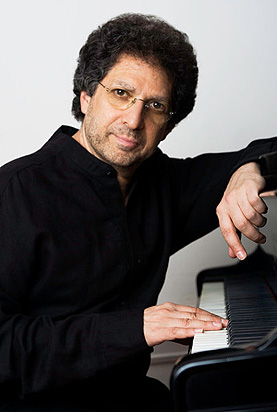 RANDY
KLEIN: I grew up in Fort Lee, NJ and I have lived in New York
City for over 30 years. I thrive on the energy of the city - it continuously
inspires me.
RANDY
KLEIN: I grew up in Fort Lee, NJ and I have lived in New York
City for over 30 years. I thrive on the energy of the city - it continuously
inspires me.
I have been playing piano since I was about 5 years old. My grandfather
played violin, my grandmother was a piano teacher, my mother was an
excellent pianist and my father played mandolin. So, music pretty
much was part of everyday life as long as I can remember. My earliest
exposure was classical music and music from Eastern Europe where my
family came from in the early 1900.
Around the time that I was 10 years old, my father owned a dance hall
in the Bronx. (it’s now part of I95 to New England) I was allowed
to go to work with him on Saturday nights as long as I stayed in the
office. Liquor was served and it was against the law for a minor to
be hanging around the bar. Saturday night was record hop night. The
DJ was the great Cousin Brucey from legendary AM radio. He played
the top hits of the day. "I’m On The Outside Looking In"
by the Little Anthony & The Imperials, "Who Wears Short Shorts"
by the Royal Teens, and as time went by, "The Twist" by
Chubby Checker. Pop hits! I would sneak out of the office and sit
behind the bandstand just absorbing the music. It is this early listening
in my life that has given me the ability to hear potential hit songs.
It helps me in my teaching of song writing. Those songs which I heard
as a young teen, had catchy hooks and choruses, a good beat, were
filled with emotions and are still hits to this day.
My mother was a musical theatre person. She loved going to shows and
she took me with her to experience the wonder of live musical theatre.
I was lucky to have seen Fiddler with Zero Mostel and Herschel
Benardi, Carol Channing and Pearl Bailey in Hello Dolly, Sammy
Davis in Golden Boy, Jack Cassidy in Superman, and too
many more to list. I loved all of it. I embraced it and listened to
the cast albums. And, my mother played the cast album of Fiddler
On The Roof every night at dinner time for about a year and a
half. "‘Sunrise Sunset", please pass the string beans’.
True story!
Then in 1967, the stars aligned and I heard the crossover hit by the
Ramsey Lewis trio, ‘The In Crowd’. It was a life changing
moment. Melody, Rhythm, audience clapping, improvisation! It was the
beginning of my lifelong love of improvised music. It is one of the
reasons that Jazzheads http://www.jazzheads.com/
(the label I started in 1992) exists and to this day is the basis
of my creativity. Honing one’s skill as an improvising musician
takes a deep commitment and because of improvised music, Jazz, as
we have labeled it, my musical direction is usually pretty clear.
I do have to say that the different influences sometimes collide with
each other and that merger has become a bit of a quest for me musically.
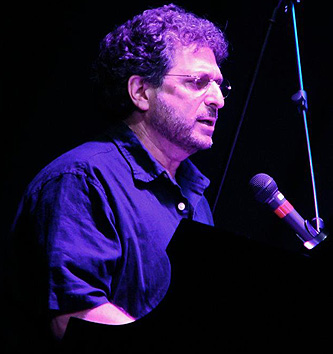 mwe3:
What piano are you performing on the What’s Next? CD and
what was the recording process like, describing the chemistry with
your producer Daryl Bornstein. What other keyboards do you play and
do you play other instruments?
mwe3:
What piano are you performing on the What’s Next? CD and
what was the recording process like, describing the chemistry with
your producer Daryl Bornstein. What other keyboards do you play and
do you play other instruments?
RANDY KLEIN: Being that I am a Steinway artist, I am playing
a Steinway B – 7’ grand. As you might know, every piano
has an individual quality to its sound and the way the instrument
reacts to a player’s touch. Unlike other instrumentalists who
play their own instrument all the time, the pianist is subject to
a life of continually adjusting to the nature of the instrument. And,
I feel strongly about this, ‘sometimes the pianos should be used
for kindling’ and yet, pianists still have to try to make music
on them.
But, luckily for me the Steinway at BiCoastal Studios in Ossining,
NY is in really fine shape. In other words, I was able to adapt to
the sound and action of the instrument quickly and found its sweet
spots.
This recording is my first collaboration with Daryl Bornstein. He
is a impeccable engineer and producer. A perfectionist like me! He
was very careful with the miking of the piano. He tried to cover all
the bases. He close miked the piano and had a pair of mikes set up
a few feet away and then had ambient mikes to pick up the sound of
the instrument from afar. He recorded everything flat and other than
adding a bit of ambient reverb to the overall recording, you are hearing
the instrument as it sounds. Daryl is also a wonderful musician himself.
This musicality is the place where we connect most. Having a second
set of ears in the studio, like Daryl’s, is a real pleasure and
allows me to just play. I look forward to working with Daryl again
on future projects.
I have at one time or another picked up most instruments and tried
to play them. I find it interesting to know what other players go
through in order to play their instrument. I did play bass for about
a year in college and played tuba and drums in high school. B3, Rhodes,
synths of all kinds, but, piano is it for me. I own a 1904 6’
Steinway and use a Yamaha P250 digital with my notation and sequencing
programs.
mwe3: Your company Jazzheads looks great. Can you tell us the
story of Jazzheads, when you began it and any label philosophy, and,
from a label perspective, what you feel the future holds for the CD
and music in general?
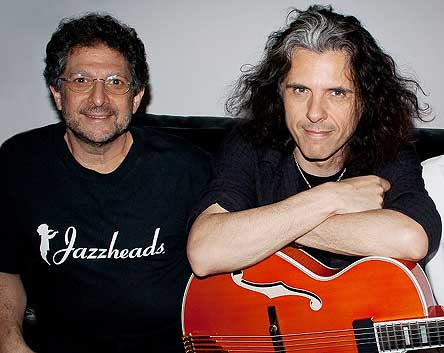 RANDY
KLEIN: Jazzheads,
the independent NYC Jazz label, is 20 years old this year. We are
very proud of the recordings we have released and the long lasting
working relationships and friendships that have helped build the label.
RANDY
KLEIN: Jazzheads,
the independent NYC Jazz label, is 20 years old this year. We are
very proud of the recordings we have released and the long lasting
working relationships and friendships that have helped build the label.
What started as frustration trying to get my music ‘out there’,
20 years later, has turned into a full-fledge independent label that
releases high quality recordings by a long list of the very finest
Jazz artists on the scene. And, I am very proud to say, two 2012 Grammy
Nominations for Bobby Sanabria’s CD, Multiverse in best
Latin Jazz and best Instrumental Arrangement categories.
Back in 1992, I was extremely upset about not getting any response
from labels for a project I was pitching. My friend, Gary Dallaire,
suggested I record and release the album myself and see what happens
(a bit ahead of the curve compared to today’s self-releasers)!
I recorded the music at HarariVille, a small studio in New Jersey,
Bob Katz the mastering engineer supreme mastered it, and I pressed
1000 copies. I sent promos out to everyone I knew and not much happened.
Then one afternoon, I remember sitting in my kitchen listening to
NYC’s Jazz station WBGO with Michael Bourne as the host. He announced
that he received a CD at his home, of all places, and was pleasantly
surprised how good it was. The CD he was referring to was my first
CD, Randy Klein’s Jazzheads. So imagine, there I was sitting
in my kitchen listening to my music being played on the air in New
York City! I was elated and, at the same time, overcome with the fact
that 1.) at that moment I was a record label and 2.) I knew zilch
about how to run a record label (I already showed my ignorance by
not putting a barcode on the back of my CD). I knew little about distribution,
retail, promotions, marketing, radio and the long list of subjects
that a label owner needs to know to run a label and make it successful.
Truthfully, I made a myriad of mistakes along the way. But I picked
myself up, learned from each mistake, and stubbornly moved forward.
What I did know was what good music should sound like and how
to make good recordings. So with this knowledge and the drive to get
my music out there, I began my 20-year journey of building Jazzheads.
As I began spreading the word that I had started a label, other musicians
with similar stories of wanting to get their music out there without
any luck in doing so, approached me. I started to partner with these
other musicians on CDs. They were responsible for recording the music
and a portion of the promotion, while Jazzheads was responsible for
manufacturing, distributing, promoting and paying royalties on sales,
when they existed. This is how the label was built: musicians (artists)
and a business entity that could work together in a fair arrangement
that allowed everyone to profit. Over the years, there have been many
ups and downs. At times I thought I would shut the whole thing down
and, at other times, I felt simply that it wasn’t worth putting
all this energy into a business that sold minimal sales and was a
niche market at best. But through it all, it was the music
that kept the label alive.
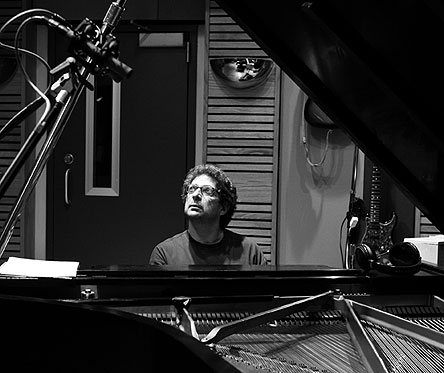 I
now realize it was worth every moment, mostly because of the invaluable
learning experience that I have had, which came from the most unlikely
source, the musicians who were making the music. I’ve gotten
to listen to them play, be in the studio with them, absorb and learn
from their vast wealth of musical knowledge. And throughout, I’ve
been in awe of these great musicians and felt honored to be able to
hang with them. Their knowledge has influenced my decisions and taught
me about the great four-letter word JAZZ. It has been the musicians
and their willingness to share their gift of music and their dedication
to the form, which has built the label. I have simply been the one
nudging it along.
I
now realize it was worth every moment, mostly because of the invaluable
learning experience that I have had, which came from the most unlikely
source, the musicians who were making the music. I’ve gotten
to listen to them play, be in the studio with them, absorb and learn
from their vast wealth of musical knowledge. And throughout, I’ve
been in awe of these great musicians and felt honored to be able to
hang with them. Their knowledge has influenced my decisions and taught
me about the great four-letter word JAZZ. It has been the musicians
and their willingness to share their gift of music and their dedication
to the form, which has built the label. I have simply been the one
nudging it along.
Jazzheads is proud to be distributed by Allegro Distributors for all
of its physical CDs and with IODA, EMusic, and Believe Digital for
its digital download distribution. We have wonderful relationships
with our promotional team headed by Chris DiGirolamo from Two For
The Show Media, with Mark Elf, Dr. Jazz and Michael Moryc for our
radio promotion. They have taken Jazzheads music, released it, moved
it out the door, brought it to new audiences to listen to, review
and read stories about. I thank them for their tireless efforts.
In our 20th year, we are proud to announce our partnership with the
Canadian record label Spectra/Musique in releasing CDs by internationally
acclaimed artists Susie Arioli and Jordan Officer to the Jazz audiences
in the United States. We are in our 5th year of releasing CDs by the
esteemed Manhattan School of Music with proceeds going back to the
MSM scholarship fund. Giving back!
Many of the artists on Jazzheads are major educators in the field
of Jazz. Dr. Chris Washburne is the Director of the Louis Armstrong
Jazz Performance at Columbia University, Justin DiCioccio is the head
of the Manhattan School of Music Jazz Department, Bobby Sanabria teaches
at MSM Jazz and the New School, Dave Liebman is also at MSM, with
Cliff Korman, Rob Derke, Jeff Lederer, Mark Weinstein teaching the
form. And I am not only he president of the label, but an active teacher
in the subjects of songwriting, improvisation and the business of
music in high schools and universities. So, not only is Jazzheads
releasing CDs with improvised music on it, we are passing the baton
to the next generation. Pretty cool!
 mwe3:
What are your other plans moving into 2013 and beyond? It looks like
you’ve got a busy year ahead.
mwe3:
What are your other plans moving into 2013 and beyond? It looks like
you’ve got a busy year ahead.
RANDY KLEIN: Well, I am always trying to create new ways of
‘getting my music out there’. Currently on my plate are
two musicals that are both in different levels of production, ‘Flambé
Dreams’ and ‘Ever Happily After’. I continue to perform
‘For
My People’ – The Margaret Walker Song Cycle, a major
music work that combines the poetry of Margaret Walker with its socially
conscious themes written for solo voices and large chorale. I am performing
with Two Duos, giving solo piano improvisation concerts and of course
teaching song writing and the business of music. Oh, by the way, did
I mention that I never sleep! Truthfully, I love what I do so much,
that I try not to waste a moment. When in doubt, improvise!
Thanks to Randy Klein @ www.RandyKlein.com



